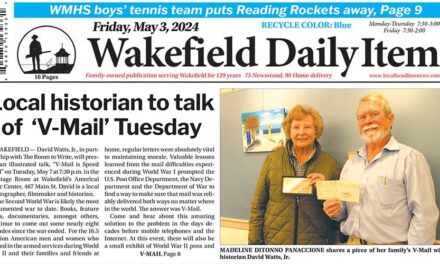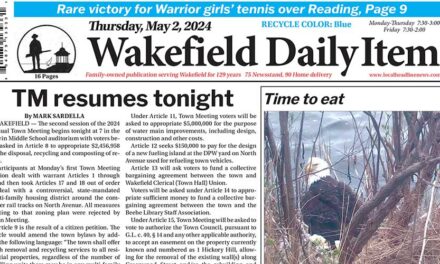Published in the August 2, 2018 edition
I’m starting a petition to ban petitions.
Actually, I would never do that. First of all, I’m much too lazy and second, it would involve talking to people, which I try to avoid whenever possible.
Saying that I want to start a petition against petitions is an attempt at irony.
Not intended to be ironic was a recent suggestion that town boards and committees should have a “public comment period” before every vote that is taken.
This idea comes in the wake of the latest cataclysm to roil the town: The Kiosk Crisis. One side sees a path to vitality and prosperity. The other side sees the end of Wakefield as we know it.
It all stems from a May 31 meeting at which the Town Council voted to approve four informational kiosks that are designed to raise awareness about Wakefield and all the town has to offer.
Apparently, the Town Council should have had a “public comment period” before taking that vote. Never mind that there was no one from the public in attendance at that point. There was a public participation period earlier in the meeting, but there was no mention of the kiosk issue.
Nearly a year ago, on Aug. 14, 2017, the Board of Selectmen voted to retain Favermann Design to help the town with a branding and wayfinding program. At that meeting, the board watched a PowerPoint presentation by Mark Favermann on the kinds of things that Wakefield could do to market the town. One of the examples Favermann discussed at that meeting was the work he’s done with the town of Ipswich, which uses kiosks — including digital — as part of its marketing effort. The board voted to hire Favermann based on his presentation that night.
The Wakefield kiosk plan emerged from Favermann’s work with the Wakefield Main Streets group and the Branding and Wayfinding Committee, some of whom liked the digital component. That final plan was discussed and approved at the Town Council’s May 31, 2018 meeting.
Now the town is being accused of keeping the kiosk plan a secret.
Meanwhile, the people demanding more transparency from the town were telling everyone that this top secret digital kiosk was over 12 feet tall and “neon.” In fact, it’s under 10 feet tall. And its single screen will be no more neon than your TV.
The town is already as transparent as it is required to be under law. To argue that it should go far beyond what the Open Meeting Law requires is ludicrous and would set a dangerous precedent.
Let’s say that the town were to sound a special alarm about one issue deemed especially important — like a plan to run an underground transmission line through town.
Then, a few months later, if the town failed to issue an equally urgent alert about something else, people would accuse the town of trying to bury the issue.
Another recent suggestion is for the town to sponsor special public informational sessions on every issue. I remember one such recent forum to inform the citizenry about the Public Safety Building project. Other than town officials, a total of four citizens showed up.
The Massachusetts Open Meeting Law is there to provide transparency in municipal government. If people choose not to take advantage of its protections, how is that the town’s fault?
The unfortunate fact is, most people don’t want to look at public meeting announcements or agendas on the town website. They don’t want to have to read the local paper. They don’t want to attend public meetings. They don’t want to watch government meetings online or on local cable. And they certainly don’t want to attend extra “informational” meetings.
They want reverse 911 calls to spoon-feed them all this stuff. Then they’ll complain that they’re getting too many calls and ignore them, too.
You can lead a horse to water, and you can give citizens access to information.
What they do next is up to them.




